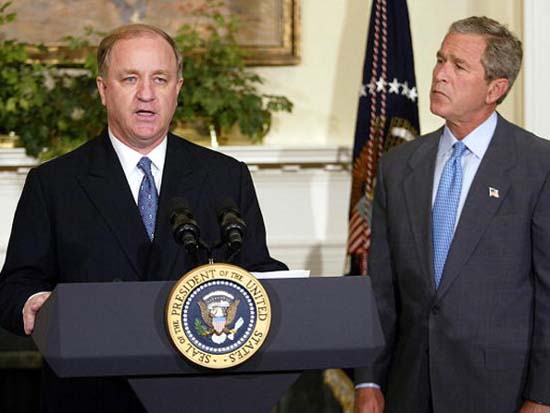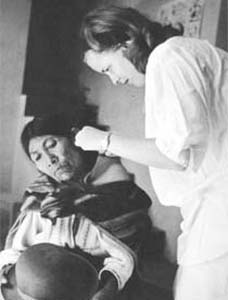July 14, 2004: Headlines: Headquarters: AIDS: HIV: VOA News: U.S. AIDS relief coordinator Randall Tobias says countries with scarce health resources are having difficulty absorbing money and increasing treatment to match the contributions.
Peace Corps Online:
Peace Corps News:
Library:
Peace Corps: AIDS :
The Peace Corps and AIDS:
March 22, 2005: Headlines: Headquarters: AIDS: HIV: Peace Corps: Global AIDS Coordinator Ambassador Randall L. Tobias – who spearheads the President's Emergency Plan – will discuss the impact the Peace Corps and other agencies have had around the world in combating HIV/AIDS :
July 14, 2004: Headlines: Headquarters: AIDS: HIV: VOA News: U.S. AIDS relief coordinator Randall Tobias says countries with scarce health resources are having difficulty absorbing money and increasing treatment to match the contributions.
U.S. AIDS relief coordinator Randall Tobias says countries with scarce health resources are having difficulty absorbing money and increasing treatment to match the contributions. "In talking with people in Africa who are involved in these programs, they are much, much more focused on the issues of infrastructure and the people and the capacity constraints than they are on the drugs because right now, they are able to get drugs, but there is so little treatment going on because the capacity doesn't exist," he said

U.S. AIDS relief coordinator Randall Tobias says countries with scarce health resources are having difficulty absorbing money and increasing treatment to match the contributions. "In talking with people in Africa who are involved in these programs, they are much, much more focused on the issues of infrastructure and the people and the capacity constraints than they are on the drugs because right now, they are able to get drugs, but there is so little treatment going on because the capacity doesn't exist," he said
Health Experts Urge Peace Corps-Like Group to Combat AIDS
By David McAlary
VOA News
Jul 14, 2004
Caption: Randall Tobias (L) speaks to reporters at The White House in Washington, DC in July, 2004, after he was nominated by US President George W. Bush (R) to coordinate global US policy to fight HIV/AIDS. (Luke Frazza/AFP/Getty Images)
WASHINGTON - An international group of public health experts is calling for a new AIDS corps modeled on the U.S. Peace Corps to fight the HIV epidemic in developing countries. The proposal is one of several initiatives the experts recommend to greatly expand health care for HIV patients in countries with inadequate medical services.
With billions of dollars flowing from the United States and other donors and with price cuts for AIDS drugs, a U.S. National Academy of Sciences panel says the time is right to vastly increase HIV treatment and prevention programs in developing nations.
New United Nations figures show that bilateral and multilateral assistance to HIV programs jumped 60 percent between 2000 and 2002. Much more is to come with most of the U.S. commitment of $15 billion yet to be distributed and other funds being targeted by the World Health Organization and the Global Fund to fight AIDS, Tuberculosis, and Malaria.
But U.S. AIDS relief coordinator Randall Tobias says countries with scarce health resources are having difficulty absorbing the money and increasing treatment to match the contributions.
"In talking with people in Africa who are involved in these programs, they are much, much more focused on the issues of infrastructure and the people and the capacity constraints than they are on the drugs because right now, they are able to get drugs, but there is so little treatment going on because the capacity doesn't exist," he said.
This is apparently part of the reason why United Nations data show that only 400,000 people have access to AIDS treatment in developing countries, a minuscule number compared to the world's 40 million infected, six million of whom the U.N. says need treatment now.
But the U.S. National Academy of Sciences panel of American and African public health specialists says the gap can be dramatically reduced if governments and international organizations help developing societies improve their ability to deliver AIDS treatments.
"The first and most important recommendation of our committee is to act now," said James Curran of Emory University in Atlanta, the chairman of the group. "Don't wait for all the answers, but act now. Don't wait until all the challenges have been met, but act now."
For the panel, acting now involves tackling AIDS not only with established public health practices but also trying new things and learning by doing.
To strengthen the weak public health infrastructure in developing countries, Mr. Curran's team recommends partnerships and knowledge sharing between experienced medical, academic, and business institutions in industrial countries and those in developing nations. They also call for a cadre of technical specialists to help these countries fight AIDS, akin to the U.S. Peace Corps.
"We assign hundreds of thousands of soldiers overseas, we assign Peace Corps people overseas, we assign State Department people overseas, we mobilize thousands of people and hire them to guard our airports," he said. "Why not tap into something to deal with a global threat like AIDS?"
The U.S. panel says other necessary ingredients for successful AIDS programs are a continuous funding commitment by donors and steps by leaders in AIDS-stricken nations to fight the stigma of the disease and encourage people to get tested for it.
When this story was posted in March 2005, this was on the front page of PCOL:
Peace Corps Online The Independent News Forum serving Returned Peace Corps Volunteers
 | The Peace Corps Library
Peace Corps Online is proud to announce that the Peace Corps Library is now available online. With over 30,000 index entries in over 500 categories, this is the largest collection of Peace Corps related reference material in the world. From Acting to Zucchini, you can use the Main Index to find hundreds of stories about RPCVs who have your same interests, who served in your Country of Service, or who serve in your state. |
 | Crisis Corps arrives in Thailand
After the Tsunami in Southeast Asia last December, Peace Corps issued an appeal for Crisis Corps Volunteers and over 200 RPCVs responded. The first team of 8 Crisis Corps volunteers departed for Thailand on March 18 to join RPCVs who are already supporting relief efforts in Sri Lanka, Indonesia, Thailand, Malaysia, and India with other agencies and NGO's. 19 Mar 2005 |
 | RPCVs in Congress ask colleagues to support PC
RPCVs Sam Farr, Chris Shays, Thomas Petri, James Walsh, and Mike Honda have asked their colleagues in Congress to add their names to a letter they have written to the House Foreign Operations Subcommittee, asking for full funding of $345 M for the Peace Corps in 2006. As a follow-on to Peace Corps week, please read the letter and call your Representative in Congress and ask him or her to add their name to the letter. |
 | Add your info now to the RPCV Directory
Call Harris Publishing at 800-414-4608 right away to add your name or make changes to your listing in the newest edition of the NPCA's Directory of Peace Corps Volunteers and Former Staff. Then read our story on how you can get access to the book after it is published. The deadline for inclusion is May 16 so call now. |
 | March 1: National Day of Action
Tuesday, March 1, is the NPCA's National Day of Action. Please call your Senators and ask them to support the President's proposed $27 Million budget increase for the Peace Corps for FY2006 and ask them to oppose the elimination of Perkins loans that benefit Peace Corps volunteers from low-income backgrounds. Follow this link for step-by-step information on how to make your calls. Then take our poll and leave feedback on how the calls went. |
 | Make a call for the Peace Corps
PCOL is a strong supporter of the NPCA's National Day of Action and encourages every RPCV to spend ten minutes on Tuesday, March 1 making a call to your Representatives and ask them to support President Bush's budget proposal of $345 Million to expand the Peace Corps. Take our Poll: Click here to take our poll. We'll send out a reminder and have more details early next week. |
Read the stories and leave your comments.

Some postings on Peace Corps Online are provided to the individual members of this group without permission of the copyright owner for the non-profit purposes of criticism, comment, education, scholarship, and research under the "Fair Use" provisions of U.S. Government copyright laws and they may not be distributed further without permission of the copyright owner. Peace Corps Online does not vouch for the accuracy of the content of the postings, which is the sole responsibility of the copyright holder.
Story Source: VOA News
This story has been posted in the following forums: : Headlines; Headquarters; AIDS; HIV
PCOL17859
23
.















